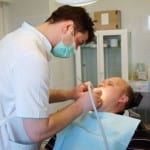 Tooth extraction is an often undesirable, but sometimes necessary, treatment. Knowing when you might need an extraction may, in some way, lessen the shock of requiring the treatment. Here is a collection of typical scenarios in which oral surgery could be required.
Tooth extraction is an often undesirable, but sometimes necessary, treatment. Knowing when you might need an extraction may, in some way, lessen the shock of requiring the treatment. Here is a collection of typical scenarios in which oral surgery could be required.
Repair is not viable
Your tooth may have suffered a fracture so severe, or been the focus of such extensive decay, that extracting the tooth will be far more practical than any attempts to restore it. Sometimes it is other obstacles than the tooth itself that cause the problem. Medical and physical both play a role in how appropriate a surgery is deemed for a patient.
Gum disease
In the later stages of gum disease, your tooth can come loose due to a lack of support from surrounding bone. In these instances, tooth extraction may be required.
Preparing for braces
Believe it or not, you can sometimes have too many teeth. Orthodontic work tries to correct an improper bite or realign a smile for ornamental reasons. If you have too many teeth, there may not be enough room for all of your teeth to align properly! In such instances, extraction is a practical surgery choice.
A note on aftercare
Most extraction surgeries will use an anaesthetic, so avoid chewing anything until the numbness wears off. If you suffer from aches or pains shortly after the surgery, take some over the counter pain killers (like ibuprofen) and apply an ice pack to the source of the pain. A blood clot will develop on the site of the extraction and it is vital that it is left alone while it forms. To help it form, avoid touching it, do not drink through a straw, do not spit forcefully, try not to sneeze too hard and avoid smoking or letting food particles near your tooth’s socket. Avoid exerting yourself in the 24 hours following surgery. After two days, rinse your mouth gently with a salt water solution and continue to do this 2 – 3 times a day for a week. Drink a lot of water and try to keep your head raised in order to control bleeding. For more information on tooth extractions, contact the team at City Dental in Leeds.








